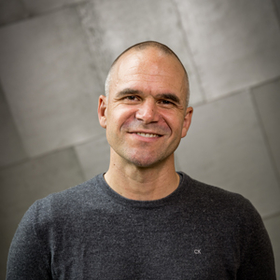

1479 Gortner Avenue
St. Paul, MN 55108
United States
Peter
Kennedy
Our research integrates multiple biological disciplines: mycology and microbiology, ecology and evolution, and molecular biology and biochemistry. Though field sampling and experiments, along with greenhouse, growth chamber, and culture-based studies, we seek to mechanistically understand how both biotic and abiotic factors influence the structure and functioning of ecological communities.
Research statement
Symbioses between microbes and other organisms play a central role in the ecology and evolution of life on Earth. My lab studies the diversity and function of fungal and bacterial communities in a wide range of ecosystems, particularly those forming symbioses with plants. We use both field- and lab-based observations and experiments to investigate how microbial communities are structured and their ecological roles in ecosystems throughout Minnesota and worldwide.
Selected publications
Names in bold indicate members of lab (some co-advised); *indicates graduate and undergraduate student advisee.
Michaud, T.J.*, Cline, L.C., Hobbie, E.A., Gutknecht, J.L. and Kennedy, P.G. Herbarium specimens reveal that mycorrhizal type does not mediate declining temperate tree nitrogen status over a century of environmental change. New Phytologist. In press.
Cantoran, A.*, Maillard, F., Baldrian, P. and Kennedy, P.G., 2023. Defining a core microbial necrobiome associated with decomposing fungal necromass. FEMS Microbiology Ecology, 99(9), p.fiad098.
Fernandez, C.W., Mielke, L.*, Stefanski, A., Bermudez, R., Hobbie, S.E., Montgomery, R.A., Reich, P.B. and Kennedy, P.G., 2023. Climate change–induced stress disrupts ectomycorrhizal interaction networks at the boreal–temperate ecotone. Proceedings of the National Academy of Sciences, 120(34), p.e2221619120.
Fernandez, C.W., Mielke, L.*, Stefanski, A., Bermudez, R., Hobbie, S.E., Montgomery, R.A., Reich, P.B. and Kennedy, P.G., 2023. Climate change–induced stress disrupts ectomycorrhizal interaction networks at the boreal–temperate ecotone. Proceedings of the National Academy of Sciences, 120(34), p.e2221619120.
Beidler, K.V., Powers, J.S., Dupuy‐Rada, J.M., Hulshof, C., Medvigy, D., Pizano, C., Salgado‐Negret, B., Van Bloem, S.J., Vargas G, G., Waring, B.G. and Kennedy, P.G., 2023. Seasonality regulates the structure and biogeochemical impact of ectomycorrhizal fungal communities across environmentally divergent neotropical dry forests. Journal of Ecology. 111(8), 1598-1613.
Kennedy P.G. and Maillard, F. (2023). Knowns and unknowns of the soil fungal necrobiome. Trends in Microbiology. 31(2): 173-180.
See C.R.*, Keller, A.B., Hobbie, S.E., Kennedy, P.G., Weber, P.K. & Pett‐Ridge, J. (2022). Hyphae move matter and microbes to mineral microsites: Integrating the hyphosphere into conceptual models of soil organic matter stabilization. Global Change Biology, 28(8), 2527-2540.
Duque A., Peña, Miguel A, Cuesta, F., Gonzalez-Caro, S., Kennedy, P.G., Phillips, O. L., . . . (2021). Mature Andean forests as globally important carbon sinks and future carbon refuges. Nature Communications, 12(1), 1-10.
Perez-Pazos, E.*, Certano, A., Gagne, J., Lebeuf, R, Siegel, N., Nguyen, N., & Kennedy, P. G. (2021). The slippery nature of ectomycorrhizal host specificity: Suillus fungi associated with novel pinoid (Picea) and abietoid (Abies) hosts. Mycologia, 113(5), 891-901.
Lofgren, L.A.*, Nguyen, N. H., Vilgalys, R., Ruytinx, J., Liao, H.-L., Branco, S., . . . Kennedy, P.G. (2021). Comparative genomics reveals dynamic genome evolution in host specialist ectomycorrhizal fungi. New Phytologist, 230(2), 774-792.
McCormack M.L., Kaproth M., Cavender-Bares J., Carlson E., Hipp A., Han Y., Kennedy P.G. (2021) Climate and phylogenetic history structure morphological and architectural trait variation among fine-root orders. New Phytologist, 228(6), 1824-1834.
Education and background
Degrees earned
- B.S. - The Evergreen State College 1999
- Ph. D. - UC Berkeley 2005
Awards and honors
- PMB Wardle Chair of Microbial Ecology – 2023-present
- Mycological Society of America Fellow – 2023
- C.I.E.S Fulbright Fellow, Colombia - 2019
- Mycological Society of America C.J. Alexopoulus Prize (Outstanding Research by an Early Career Mycologist) - 2015
- International Mycological Association Buller Prize (Outstanding Young Mycologist from North America) - 2014
- Mycological Society of America Martin-Baker Research Award - 2012
- C.I.E.S Fulbright Fellow, Mexico - 2010
Teaching statement
In teaching, I strive to expose students to a variety of different learning opportunities, ranging from lectures and primary literature discussions to field- and laboratory-based research. My teaching philosophy includes: 1) providing opportunities for students to directly participate in the process of science, 2) stressing the importance of critical and quantitative thinking, 3) rooting knowledge in history, while also stressing modern issues at the cutting edge of biology, and 4) sharing my deep enthusiasm for the diversity of life on earth.
Courses taught at UMN
- Foundations of Biology (Biology 2003)
- Plant, Algal, Fungal Diversity (Plant & Microbial Biology 3007)
- Field Mycology (Plant & Microbial Biology 5812/3812)
Research Seminars
- 2023: St. Olaf College, Northfield, MN
- 2023: Cedar Creek Ecosystem Science Reserve, East Bethel, MN
- 2023: Center for Tree Science, Morton Arboretum, Lisle, IL
- 2022: Humboldt State University, Arcata, CA
- 2022: University of Minnesota, Duluth, Duluth, MN
- 2021: Clemson University, Clemson, SC
- 2021: University of Washington, Seattle, WA
- 2021: Swedish National Agricultural University (SLU), Uppsala, Sweden
Professional experience
University of Minnesota, Twin Cities
- Associate Dean for Research, College of Biological Sciences 2022-present
- Professor 2020-present
- Associate Professor 2013-2020
- Interim Curator of Fungi, Bell Museum 2017-2019
Lewis & Clark College
- Assistant Professor 2007-2013
University of California, Berkeley
- NPER Post-doctoral Fellow 2005-2007
Current grants
- National Science Foundation & Department of Energy